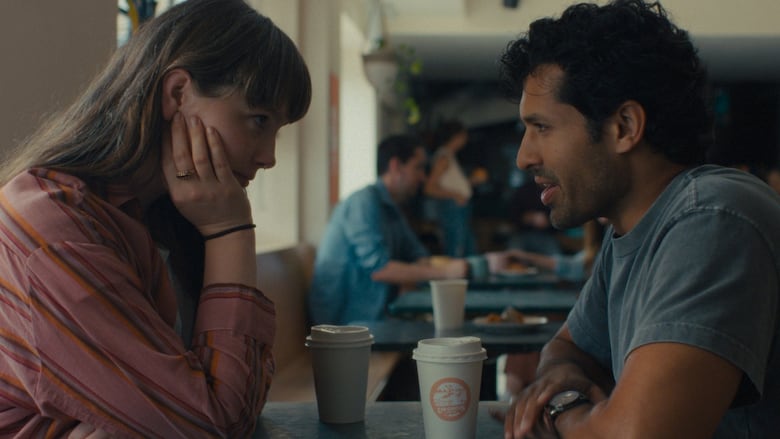The new film Shook captures suburban life in the GTA 'in a very, very beautiful way'
Culture critics Jackson Weaver, Rachel Ho and Joyita Sengupta discuss the Canadian movie set in Scarborough

With another buzzy, homegrown movie, this is shaping up to be an exciting year for Canadian film.
Shook is filmmaker Amar Wala's first dramatic feature. It follows a struggling writer named Ashish as he falls for a barista, and learns his estranged father has Parkinson's disease. The film is set in Scarborough, Ont., and has been praised for its authentic and loving representation of the community.
Today on Commotion, culture critics Jackson Weaver, Rachel Ho and Joyita Sengupta join guest host Rad Simonpillai to discuss the new film, and what it adds to the growing canon of films & TV shows set in the Greater Toronto Area.
We've included some highlights below, edited for length and clarity. For the full discussion, including reviews of the new horror films Weapons and Together, listen and follow Commotion with Elamin Abdelmahmoud on your favourite podcast player.
Rad: The filmmaker Amar Wala is mining his own experiences here. Joyita, when he's doing that, he's tackling the 20-something experience specifically from a South Asian Canadian lens. How do you feel about the way Amar Wala tackles these experiences?
Joyita: I mean, they're very specific, which we always love in a film. I'm South Asian, obviously, but I'm also from the ends myself. I'm not from Scarborough. I'm from, like, around Rexdale. I mention that because what he's capturing is a very layered experience. You have this character that's South Asian. He doesn't seem super in touch with his South Asian culture. We never really learn what kind of Indian, or Pakistani, or Bangladeshi or Desi that he is. He doesn't speak his language, even though he immigrated to Canada after a certain age. He does introduce himself as Alex; he says multiple times to other people, not just the girl in the coffee shop. It's interesting because it captures this person who is brown, but their culture is more Scarborough than it is Desi. And I think that is something that a lot of people can relate to. Like, I get it. I'm someone who was born and raised in this city. I have a name that people struggle to pronounce, and there are those aspects of feeling like downtown, the experience of white transplants in the city is so far away from you, and it's just out of reach. This film captures that sort of tension really well.
Sometimes I'm someone who doesn't always love a brown-white interracial relationship on-screen, just because it's one that we've seen so many times. But what I think Wala does really well here is capture the tension between these two characters — this feeling of, she can move through the world in a different way than Ashish can. I feel like that is captured well. She doesn't feel like she's talking down to him, that she's looking down on his experiences, but she also is out of depth here. She's like, "I don't know what Hakka food is. I've never been east of, like, Woodbine." As a brown kid from the ends, if you go downtown, that's like a dime a dozen. I've been to a lot of parties where I meet girls like her….
Rad: I think in what you're talking about there is an underlying aspiration for whiteness, on top of being part of the downtown core and all of that stuff.… Rachel, we've actually had a lot of films and TV shows recently that are shining a light on diverse neighborhoods in the Greater Toronto area. I'm thinking of Sort Of, and Late Bloomer, and Boxcutter. What do you think Shook is adding to this canon?
Rachel: It's the suburban life. Because normally when you look at a film about Toronto, it is city, like, downtown Toronto. But I love this one's like, he's trying to catch the last train in, or take the blue light bus. That's something that if anybody of us grew up outside of the city, in the suburbs, we all really understand that pain of having to take the blue light bus back home. Like, that sucks. But I love that it's showing a part of Toronto like Scarborough that has been very maligned, and it shows it in a very, very beautiful way. Like, I still have friends who are from Markham and Richmond Hill, and they refuse to go to Scarborough because they're like, "It's scary." I was like, grow up.
Yesterday I was walking downtown, and I heard a white guy on the phone like, "You've never been to Scarborough? They have the best food, bro." And I was like, "Oh my, who are you?" So I think there is a growing acknowledgement of Scarborough that has moved on from, certainly, what we grew up with, where Scarborough was looked at in such a demeaning way. And I think mostly it is because of the food, to be honest, because everyone's become so foodie-centric…. I think that this film does a great job of showing all the different aspects of Scarborough, what makes it beautiful — not just the food, but community as well. And it's very refreshing to see that part of the city shown in a way that is very positive. There's no trauma — an immigrant story that doesn't have any trauma to it. That's very nice as well, and something I hope we see more of.
You can listen to the full discussion from today's show on CBC Listen or on our podcast, Commotion with Elamin Abdelmahmoud, available wherever you get your podcasts.
Panel produced by Ty Callender.